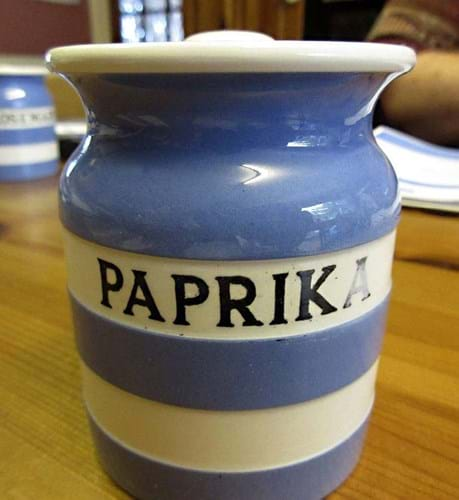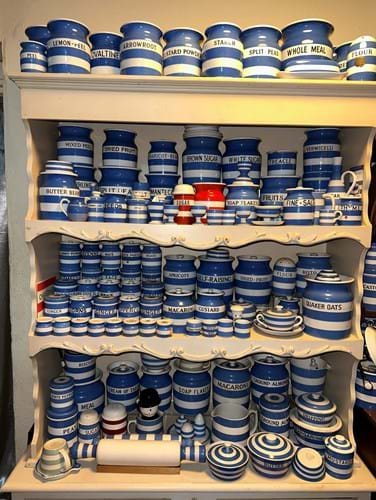Aimee Bailey, 46, and Craig Bailey, 53, were convicted at Leicester Crown Court after changing their plea to guilty on November 6. Their sentence was handed down the next day.
The case came to court following an investigation by Leicestershire County Council’s Trading Standards service.
The pair received suspended sentences and were ordered to pay £80,000.
The case began when a group of Cornishware collectors became aware of suspicious activity in 2017 and were able to gather evidence that common, lower-priced Cornishware pottery storage jars were being repurposed and resold as rarer jars and sold to unsuspecting collectors online.
Trading Standards
Following an investigation Leicestershire County Council’s Trading Standards service prosecuted the Baileys for fraud, after analysis of items of pottery they had sold to seven victims “showed that all had been altered to appear more valuable than they were”.
Gary Connors, head of Leicestershire Trading Standards Service, said: “This fraud was organised and repeated with the sole intention of making a substantial profit on every sale.
“The defendants proactively engaged online with collectors of Cornishware to scam them into buying fakes. This form of fraud can be challenging in terms of gathering sufficient evidence to bring prosecution.
“This case sends a clear message to those that seek to commit fraud within a niche trading sector; you are not ‘under the radar’, we will investigate and prosecute any form of fraudulent trading that seeks to undermine a sector that by its nature is reliant on truthful trading practices.”
Among the collectors who were able to report the problem to Trading Standards was collector and antiques dealer Campbell McCutcheon.
McCutcheon, who runs Fearn Antiques & Vintage Postcard Emporium near Tain in the Scottish Highlands, is also a collector of Cornishware and part of the administration team of the T G Green (Pottery) Collectors Group.
‘Really good job’
He said: “Trading Standards did a really good job. However, there are still some fakes out there. Our advice is check with a specialist or get in touch with the collectors group if there are any doubts. Once you know what to look for it is easy to spot.” For advice on what to look out for see the box above.
Following the tip off from the col lectors group, Leicestershire Trading Standards launched an investigation by purchasing a pot from the Baileys and then comparing it with a pot bought by one of the victims and a genuine Cornishware item sourced directly from the manufacturer.
Most of the sales were conducted through the Facebook collectors group, whose members were told by Aimee and Craig Bailey (operating from Lubenham near Market Harborough) that they had managed to acquire so many rare pots from a reclusive collector in Yorkshire.
Trading Standards sent the pots seized for expert analysis, which showed that the pots sold by the Baileys had been tampered with.
In all, it was discovered that the Baileys had acquired a total of £40,000 from seven victims for items which were worth considerably less.
The court heard in one case Craig Bailey bought a jar marked Sago from eBay for £29.99. The label on the jar was altered to the much rarer Walnuts and then sold by Aimee Bailey for £400.
A Leicester Crown Court judge (after several delays due to Covid) sentenced the Baileys to 21 months imprisonment each, suspended for two years, and imposed a community punishment order which means both need to carry out 80 hours of unpaid work in the community. The court heard in mitigation that Craig Bailey had no previous convictions, and that Aimee Bailey is of good character and has a steady income.
They were also ordered to pay compensation to the seven victims totalling £40,850 (£20,425 to pay each) and prosecution costs of £40,000 to be paid within three years (£20,000 each).
The judge granted a forfeiture order for the pottery in the possession of Leicestershire Trading Standards, including items seized from the home of the Baileys and the items sold to the victims.
Cornishware: a brief guide
Cornishware, the distinctive striped kitchenware brand trademarked to and manufactured by TG Green & Co was launched 100 years ago. After ceasing production in the 2000s it was bought by two British businessmen who relaunched it and it is now made in south west England with Cornish clay.
Names
The rarer vintage name jars are the ones that have been faked, with labels such as Oxo, Lemon Peel, Orange Peel and even names that are not original such as Malted Milk and Lemon Curd.
One unusual example is Milk Cooler. There were six made for a house in East Anglia in the 1930s which sold at auction in the 1990s. These jars have a hole to the base. However, two more were created by the Baileys: one of these fakes is with Trading Standards and will be destroyed but one is still unaccounted for.
Fonts
Cornishware comes in five or six different fonts. From research the Collectors Club believes the Serif font has been faked but Sans Serif has not.
Prices
Common vintage Cornishware jars, for example plain ones or ones labelled Sugar, sell for around £15-30. While rare ones such as Walnuts sell for in the region of £400-600, Ovaltine commands as much as £1500 while rarer still is an example such as Gofio (a type of flour from the Canary Islands) which has sold for £2500.
The TG Green (Pottery) Collectors Group has around 3000 members worldwide. Find it on Facebook https://www.facebook.com/groups/24632304824












